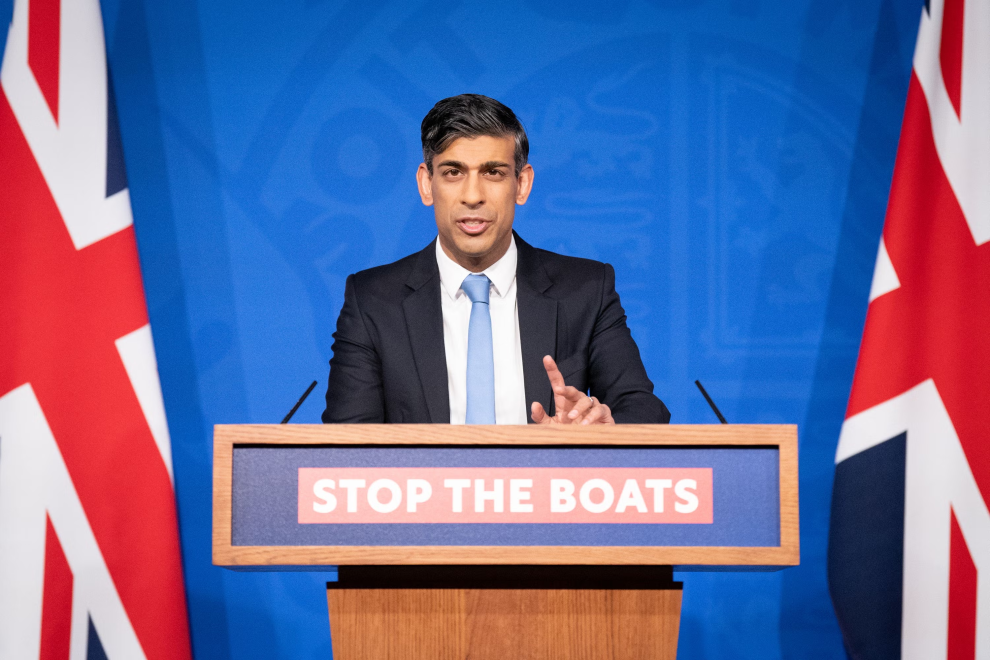AFTER last night’s Commons vote, they want a ‘proof of concept’ journey to get the tawdry policy back on track. But it’s too flawed for that
There will be a sigh of relief in No 10 with the passing of the Rwanda bill, as well as a degree of frustration. Having to steward another migration bill through parliament was not part of the government’s plan.
With the Rwanda bill passing on to the statute book, overriding the supreme court judgment that Rwanda is not a safe country to which to send people seeking sanctuary, the government now hopes it can finally get on with locking up and then removing those seeking safety on our shores. The prime minister told a hastily arranged press conference on Monday morning that the first flight would not take off for “10 or 12 weeks” (having previously said it would be in spring). Officials are privately describing it as a “proof of concept” flight – this means focusing on having an initial flight to test how legally watertight the new laws are.
There are different views on this within government and officials quietly say they don’t know exactly how legal challenges will play out. Yet the PM is bullish, triumphant even. “Nothing will stand in our way,” he said after his bill cleared the Lords late last night.
The last time the Home Office tried to get a flight to Rwanda, back in June 2022, soon after the plan was first announced, only seven people who had come to the UK to seek refuge were left on the plane at the last minute when the ECHR issued an injunction stopping the flight.
At the time, the government was planning to have dozens of people removed, but individual legal challenges resulted in the number quickly dwindling. The same is likely to happen again.
To avoid this, the Home Office is understood to have identified those cases that are considered to be the most difficult to challenge. But although the new legislation makes it significantly harder to bring successful individual challenges, there are still avenues that will be explored, particularly based on the potential harm to an individual’s mental and physical health. Lawyers have said they are seeking to do this. Rightly so.
But one flight taking off will hardly be a great success. The former home secretary Suella Braverman admitted as much on LBC last week when she said a “token flight with a low number of passengers on it … that’s not a deterrent”. She said there need to be hundreds of people on flights on a regular basis. At his press conference on Monday, Sunak pledged “multiple flights a month, through the summer and beyond”, suggesting thousands of people will be shipped to Rwanda.
That is unlikely to happen. Leaked documents suggest in the first year the government intends to send as few as 500 people to Kigali. And the accommodation that was to be used that the Rwandan government proudly showed off to Braverman when she visited last year has now apparently been sold off.
The government still expects us to believe that as soon as a flight does take off, whether it is just one or several planes, a magical deterrent effect will immediately kick in, and the boats will stop coming. Yet the evidence from organisations working with refugees and researchers all points in the opposite direction. An academic who spent four weeks speaking to people in northern France found nobody was deterred by the threat of being sent to Rwanda. Instead, the conditions in makeshift camps and the violence of the French police “further motivates people to cross” the Channel.
Organisations in the asylum sector are already finding that fear is pushing people into taking even more dangerous journeys to avoid detection. “People are saying they will not stop coming: it’s better to die trying,” says one of the organisations working with people currently in northern France.
Data quietly published early on Monday morning by the Home Office shows there are nearly 52,000 people stuck in the asylum system without their claims being processed and with no prospect of being sent to Rwanda or anywhere else. Shut out of the system indefinitely, unable to work, stranded, with the government having to spend millions of pounds every day to accommodate them. And those numbers will quickly increase, doubling to at least 80,000 by the end of the year.
The government wants us to see them all as “illegal migrants”. To dehumanise them so they are not seen as men, women, children, fathers, mothers, brothers and sisters. And it never wants to say where they are from – countries such as Afghanistan, Iran and Eritrea, where oppressive regimes chase down their opponents – and from countries such as Sudan and Syria, where brutal conflicts are playing out.

















